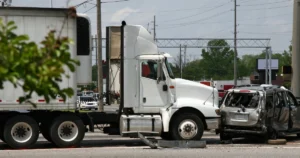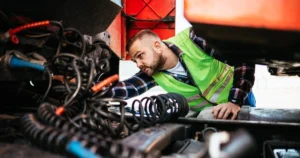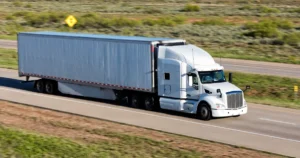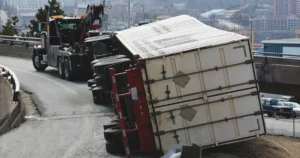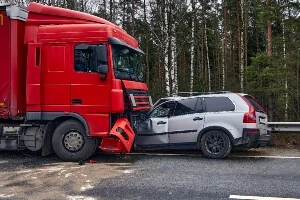 Underride truck crashes represent one of the most devastating types of vehicle accidents, often resulting in catastrophic injuries or fatalities. These accidents often leave victims facing overwhelming medical bills and complex legal challenges, making legal assistance necessary for victims seeking compensation.
Underride truck crashes represent one of the most devastating types of vehicle accidents, often resulting in catastrophic injuries or fatalities. These accidents often leave victims facing overwhelming medical bills and complex legal challenges, making legal assistance necessary for victims seeking compensation.
Table of Contents
- What Are Underride Truck Accidents and Why Are They So Dangerous?
- Who Is Liable After an Indiana Underride Truck Accident?
- How Much Compensation Can I Receive After an Underride Crash in Indiana?
- How Do Underride Truck Accidents Happen in South Bend?
- Critical Differences Between Side, Rear, and Front Underride Crashes
- Federal and Indiana State Regulations on Truck Underride Guards
- What Evidence Is Needed to Prove Fault in an Indiana Underride Truck Accident?
- How to Avoid Being Involved in an Underride Truck Accident in South Bend
- Why Hiring a South Bend Truck Accident Lawyer Matters to Your Case
- Call Our Trusted South Bend Truck Accident Lawyers Today
At [firm-name], our experienced South Bend truck attorneys have successfully represented numerous truck accident victims throughout Indiana, securing the compensation they deserve. Our legal team combines knowledge of commercial trucking regulations with aggressive negotiation tactics to ensure trucking companies and their insurers are held fully accountable.
Request a FREE case review today. Call: (574) 444-0741
What Are Underride Truck Accidents and Why Are They So Dangerous?
Underride truck accidents occur when a smaller vehicle collides with a large commercial truck and slides underneath the truck’s body or trailer. Due to the significant height difference between passenger vehicles and commercial trucks, these crashes typically happen during rear-end or side-impact collisions.
These crashes are particularly damaging because they often result in the passenger compartment being crushed or torn off, bypassing the vehicle’s standard safety features. Unlike typical collisions where crumple zones, airbags, and seat belts provide protection, underride crashes frequently cause catastrophic head and neck injuries or decapitation. Even at relatively low speeds, these accidents have a high fatality rate, with survivors often facing life-altering traumatic brain injuries, spinal cord damage, and severe disfigurement.
Who Is Liable After an Indiana Underride Truck Accident?
Determining liability after an underride truck accident involves identifying all potentially responsible parties, which often extends beyond just the truck driver. Victims who are aware of who can be held accountable often heighten their chances for maximized compensation.
The Truck Driver
The truck driver may bear primary responsibility if negligent behaviors such as distracted driving, fatigue, improper lane changes, or failure to maintain required safety equipment contributed to the accident.
The Trucking Company
Trucking companies can be liable for their employees’ actions through vicarious responsibility, negligent hiring practices, inadequate training, or hours-of-service violations.
Truck Manufacturers or Maintenance Providers
Defective truck parts (including faulty underride guards) or improper maintenance that contributed to the accident can make manufacturers or maintenance companies legally responsible.
Third-Party Contractors
Companies responsible for loading the truck may be liable if improper loading contributed to the accident by affecting the truck’s stability or maneuverability.
How Much Compensation Can I Receive After an Underride Crash in Indiana?
Compensation after an underride crash typically exceeds standard vehicle accidents due to the catastrophic nature of these collisions. Victims often require lifetime medical care for traumatic brain injuries, spinal cord damage, or extensive reconstructive surgeries. This pushes settlements into the hundreds of thousands or even millions of dollars, depending on injury severity, long-term impact, and available insurance coverage.
In wrongful death cases following an underride accident, Indiana law allows families to pursue substantial damages for loss of financial support, funeral expenses, medical costs before death, and loss of love and companionship. These cases acknowledge the uniquely devastating nature of underride crashes, where safety features are often bypassed entirely, resulting in nearly instant fatalities. When calculating appropriate compensation, the courts recognize both the economic losses and the profound emotional impact on surviving family members.
How Do Underride Truck Accidents Happen in South Bend?
South Bend’s high-volume commercial trucking routes, seasonal weather conditions, and proximity to major interstate highways create several risks for underride accidents. These dangerous crashes typically occur in the following scenarios:
- Sudden stops on I-80/90 toll road when trucks brake unexpectedly in heavy traffic, causing trailing vehicles to slide beneath their trailers
- Poor visibility conditions during Lake Michigan snow squalls or dense fog, particularly along US-31 and SR-933
- Truck driver fatigue after long hauls from Chicago or Detroit distribution centers
- Inadequate side guards on commercial vehicles navigating South Bend’s busy downtown streets
- Poor Visibility Conditions: Areas with low visibility due to rolling terrain, sudden dips, outdated roadway design, numerous commercial access points, and inadequate street lighting
- Construction zone congestion along infrastructure projects that force trucks and passenger vehicles into closer proximity
- Truck backing maneuvers in commercial areas and shopping centers without proper spotters or safety protocols
Critical Differences Between Side, Rear, and Front Underride Crashes
The characteristics of each type of underride crash present unique dangers and occur under different circumstances, requiring specific safety measures and legal approaches to determine liability.
Rear Underride Crashes
Rear underride crashes occur when a passenger vehicle strikes the back of a commercial truck and slides underneath the trailer. These accidents frequently happen when trucks brake suddenly, have faulty rear reflectors or lighting, or are parked unsafely on roadsides. While federal regulations mandate rear underride guards, these could be outdated or damaged, providing insufficient protection. Victims often suffer catastrophic head and neck injuries as the windshield and roof make first contact with the trailer edge.
Side Underride Crashes
Side underride collisions happen when a smaller vehicle slides under the side of a trailer, typically at intersections, during lane changes, or in low-visibility conditions. Unlike rear guards, side underride protection is not federally mandated on most trailers, creating a deadly vulnerability along the entire length of the trailer. These crashes frequently occur at higher speeds than rear underrides and have higher fatality rates because the passenger compartment can be completely crushed as the vehicle penetrates deeper under the trailer.
Front Underride Crashes
Front underride accidents involve a truck driving over the rear of a passenger vehicle or a head-on collision where the smaller vehicle slides under the truck’s front cab. These rare but extremely deadly crashes often occur when trucks follow too closely behind smaller vehicles or when a smaller vehicle crosses the centerline. Many commercial trucks have a large hood with minimal protections, enabling the truck to penetrate the passenger compartment easily. Survival rates for front underride crashes are exceptionally low due to the direct impact on occupants.
Federal and Indiana State Regulations on Truck Underride Guards
Both federal regulations and Indiana state laws establish requirements for underride protection on commercial vehicles. Being aware of these regulations is crucial when determining liability when guards fail in crash cases.
- Federal Motor Vehicle Safety Standard (FMVSS) 223 and 224: Establish minimum strength and height requirements for rear underride guards on trailers manufactured after 1998
- Stop Underrides Act: Federal legislation that would require stronger rear guards and mandate side and front underride protection on all commercial trucks
- Indiana Code 9-19-11: Requiring annual inspection of underride guards as part of commercial vehicle safety protocols
- Indiana Senate Bill 265: State legislation that would establish Indiana-specific standards exceeding federal requirements for underride protection
- Compliance Enforcement: The Indiana State Police Commercial Vehicle Enforcement Division conducts regular inspections targeting underride guard compliance
- Grandfather Clause Issues: Many older trucks on Indiana roads remain exempt from newer safety standards due to manufacturing date exceptions
- Insurance Requirements: Indiana requires commercial carriers to maintain higher liability coverage specifically addressing underride crash scenarios
What Evidence Is Needed to Prove Fault in an Indiana Underride Truck Accident?
Underride accidents present challenges that require specialized evidence. Focusing on these specific types of evidence can make a difference in establishing liability in your claim.
- Underride Guard Reports: Maintenance records showing the condition, structural strength, and status of rear, side, or front guards
- Guard Debris: Physical evidence and photos of guard fragments to determine if failure occurred due to design defects, poor maintenance, or impact.
- Trailer Height Measurements: Documentation showing if the trailer exceeded legal height limits or had improper ground clearance
- Reflective Tape and Visibility: Evidence of missing, damaged, or obscured reflective markings on the trailer
- Impact Point: Detailed photos showing the angle and how deep the truck penetrated the smaller vehicle
- Truck Lighting: Evidence showing if all required trailer lights were operational at the time of the crash
- Expert Testimony: Specialized testimony linking specific injury patterns to the underride mechanism
- Guard Manufacturer Records: Information about design specifications, testing data, and known defects in the specific underride protection system
How to Avoid Being Involved in an Underride Truck Accident in South Bend
Commercial trucks play an essential role in South Bend’s economy, but their presence on our roadways creates unique dangers that require specific defensive-driving strategies. You can significantly reduce your risk of underride collisions by understanding how to safely share the road with these massive vehicles.
- Maintain a Safe Following Distance: Stay at least 4-6 seconds behind trucks to ensure enough stopping distance if they brake suddenly
- Be Aware of Blind Spots: Remember the “No Zone” rule – if you can not see the truck driver in their mirrors, they can’t see you
- Avoid Staying Next to Trailers: Pass trucks completely rather than driving beside them for extended periods
- Exercise Extra Caution in Poor Weather: Increase following distance during rain, snow, or fog when visibility of trailer edges decreases
- Watch for Wide Turns: Give trucks extra space at intersections as they require more room to maneuver
- Be Alert for Stopping Trucks: Watch for brake lights and slow down immediately when trucks ahead begin stopping
- Use Your High Beams: When safe, use high beams at night to better illuminate trailer reflectors and guards
- Avoid Distracted Driving: Keep your full attention on the road, especially when trucks are nearby
- Be Predictable: Use turn signals early and avoid sudden lane changes around large trucks
- Exercise Extreme Caution During Dark Periods: Use headlights and remain focused during high-risk periods when trailer visibility is lower
Why Hiring a South Bend Truck Accident Lawyer Matters to Your Case
Underride truck accident cases involve complex federal regulations, multiple potentially liable parties, and powerful insurance companies that aggressively protect their interests. A South Bend truck accident attorney brings specialized knowledge of federal trucking laws and Indiana-specific statutes directly impacting your case outcome. Your Pfeifer Morgan & Stesiak lawyer will immediately secure crucial electronic data before it disappears and identify all insurance policies that may provide compensation.
The injuries that result from an underride accident often require lifetime medical care, creating damages that can reach millions of dollars. Insurance companies know this and will offer quick, inadequate settlements to unrepresented victims. Your Pfiefer Morgan & Stesiak attorney understands the full impact these injuries have on victims and possesses the negotiation skills and trial experience to maximize your compensation. This allows you to focus on recovery while they handle the legal complexities, ensuring no deadlines are missed and no potential sources of compensation are overlooked.
Call Our Trusted South Bend Truck Accident Lawyers Today
Underride accidents represent one of the most devastating types of truck crashes, with liability often extending beyond just the driver to include trucking companies, manufacturers, and maintenance providers. When you face the result of these collisions, understanding your legal options becomes essential to securing the compensation you deserve.
At Pfeifer Morgan & Stesiak, our legal team stands ready to investigate every aspect of your underride accident case. We identify all responsible parties and hold them accountable for their negligence. Our track record of securing maximum compensation for truck accident victims across South Bend speaks to our commitment and expertise.
Do not face these complex legal challenges alone. Contact our office today or fill out our case evaluation form to schedule your free consultation.
Millions recovered for our clients. Call: (574) 444-0741 today

